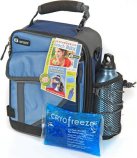When packing bag lunches for school and work, remember these food safety tips from the U.S. Department of Agriculture (USDA). Using good food safety when preparing and storing food reduces the risk of food poisoning.
 Start with a clean hands and a clean preparation area. Wash your hands with soap and warm water for 20 seconds, or long enough to sing Happy Birthday twice. Use hot soapy water to clean cutting boards, dishes, utensils, and countertops. Prevent cross-contamination by cleaning cutting boards and utensils that have been used to prepare meat or produce before using them to prepare other foods. If they need sanitizing, use a solution of 1 tablespoon of unscented, liquid chlorine bleach in 1 gallon of water.
Start with a clean hands and a clean preparation area. Wash your hands with soap and warm water for 20 seconds, or long enough to sing Happy Birthday twice. Use hot soapy water to clean cutting boards, dishes, utensils, and countertops. Prevent cross-contamination by cleaning cutting boards and utensils that have been used to prepare meat or produce before using them to prepare other foods. If they need sanitizing, use a solution of 1 tablespoon of unscented, liquid chlorine bleach in 1 gallon of water.
Wash and dry fresh produce. Wash fresh produce under cool, running water. Don’t use soap or commercial washes. Firm produce such as melons, cucumbers and potatoes should be scrubbed with a brush. Dry the produce with a clean cloth or paper towel. These recommendations will reduce but not completely eliminate the risk of food poisoning from bacteria or parasites.
Keep cold lunches old and hot lunches hot. Cooked food, such as deli meats, hard boiled eggs, vegetable dishes or pasta salads need to be kept cold. If you can use a refrigerator at work or school, store perishable items there as soon as you arrive with the lid of your insulated bag open so that cold air can circulate. If you don’t have a fridge, use a gel pack or frozen juice box or frozen bottle of water to keep perishable food items cold. Of course,
Use an insulated thermos to keep hot foods like food like soup, chili, and stew hot. Before you fill it with food, fill it with boiling water and let stand for a few minutes. Then, empty the water and fill it with your food. This method allows your hot food keep more of its heat.




